英语语法冠词和不定冠(英语语法冠词练习)
这里是 Yvonne英语杂记!
今天要分享的是英语“冠词”
英语语法——“冠词”冠词的分类① 不定冠词 (a/an)
② 定冠词 (the)
③ 零冠词 ()
冠词的分类不定冠词:a / an“不定冠词”有两个,分别是“a”和“an”
① 相同点:表示“一个”,用于修饰“可数名词单数形式
② 不同点:“a”用于辅音开头的单词,“an”用于元音字母发音开头的单词
不定冠词a/an定冠词:the① 用于特指
Hello!
这里是 Yvonne英语杂记!
今天要分享的是英语“冠词”
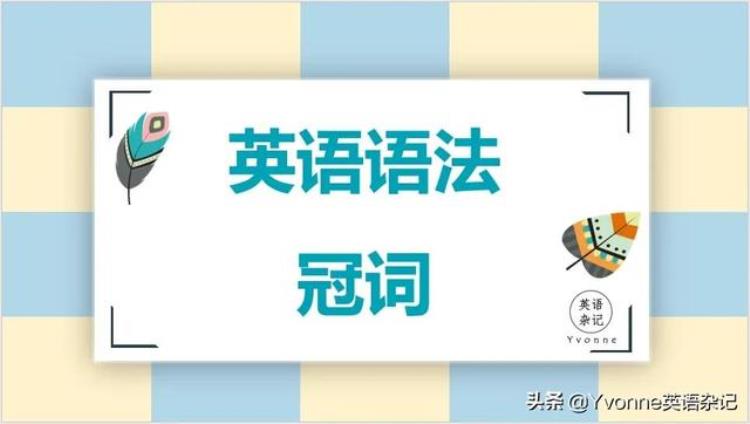
英语语法——“冠词”
冠词的分类① 不定冠词 (a/an)
② 定冠词 (the)
③ 零冠词 ()
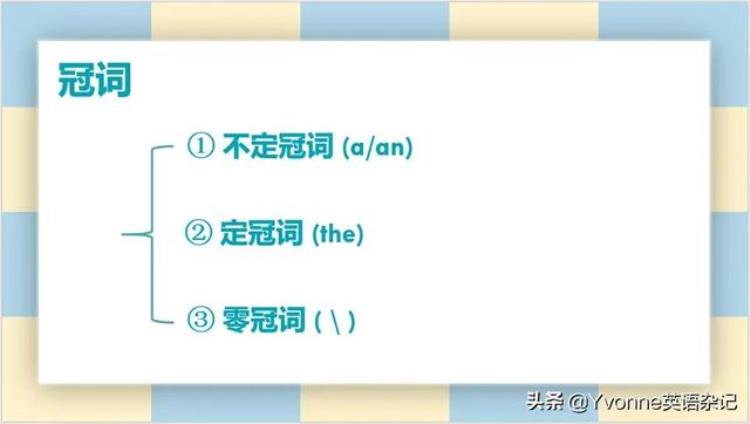
冠词的分类
不定冠词:a / an“不定冠词”有两个,分别是“a”和“an”
① 相同点:表示“一个”,用于修饰“可数名词单数形式
② 不同点:“a”用于辅音开头的单词,“an”用于元音字母发音开头的单词
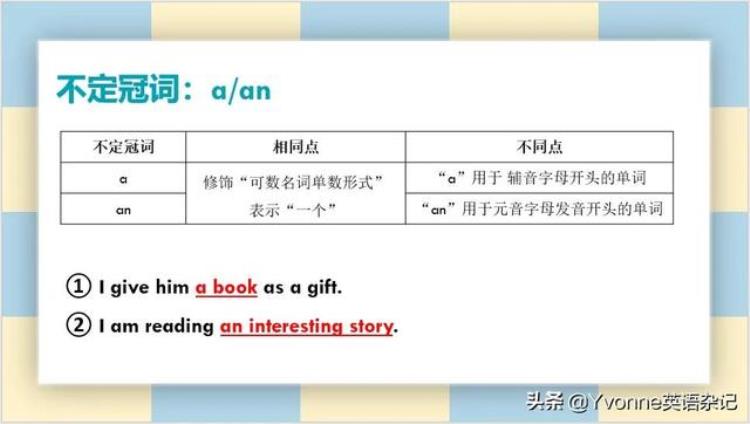
不定冠词a/an
定冠词:the① 用于特指某人或某物(上文提到的人或物之前,以及说话双方都知道的人或物)
例子:
⑴ We have a cat. The cat is black.
( cat 提到第二次要使用定冠词the)
⑵ The woman under the tree is my teacher.
(The woman 特指站在树下的女士,使用冠词the)
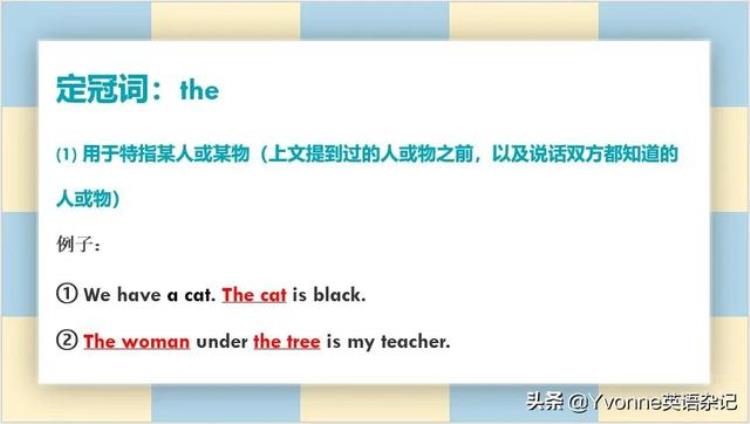
⑴ 用于特指某人或某物
② 用于世界上“独一无二”的事物名词前,譬如:太阳,宇宙,地球,月球
例子:
⑴ The earth goes around the sun.
( earth地球和sun太阳是独一无二的事物,要使用定冠词the)
⑵ He looks up at the stars in the sky.
( stars星星是独一无二的事物,要使用定冠词the )
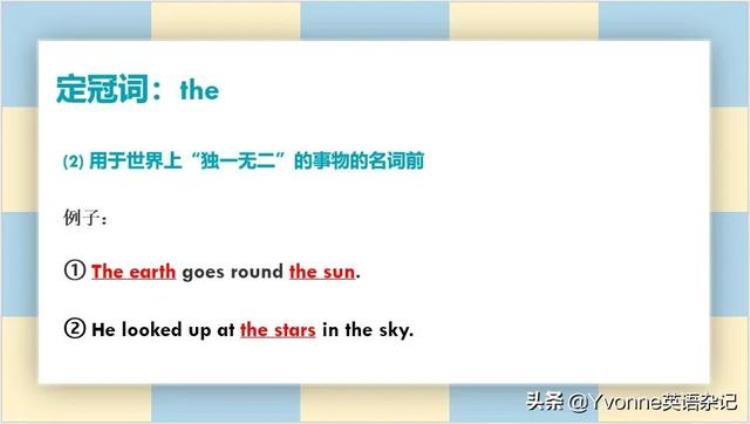
⑵ 用于独一无二的事物名词前
③ 用于最高级前,用于形容词或副词的最高级前
例子:
⑴ Who picked the most apples?
( most 最多,表示最高级,要用定冠词the )
⑵ He is the best father in the world.
( best 最好,表示最高级,要用定冠词the )
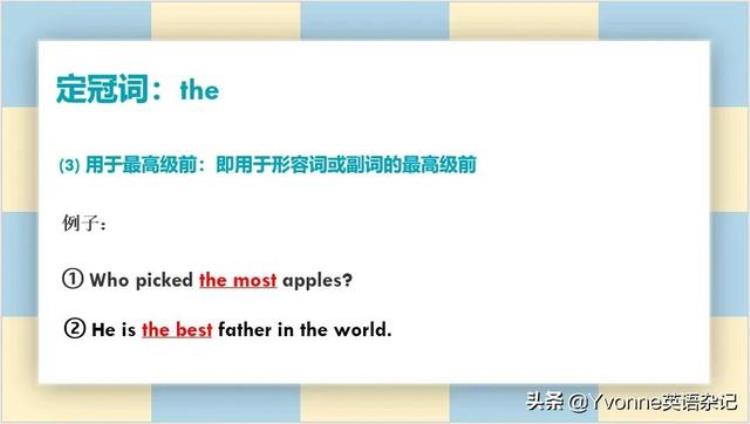
⑶ 用于最高级前
④ 用于序数词或方位词前
例子:
⑴ He was the first man to think of it.
( first 第一,表示序数词,要用定冠词the)
⑵ Italy is in the south of Europe.
( south 南方,表示方位,要用定冠词the)
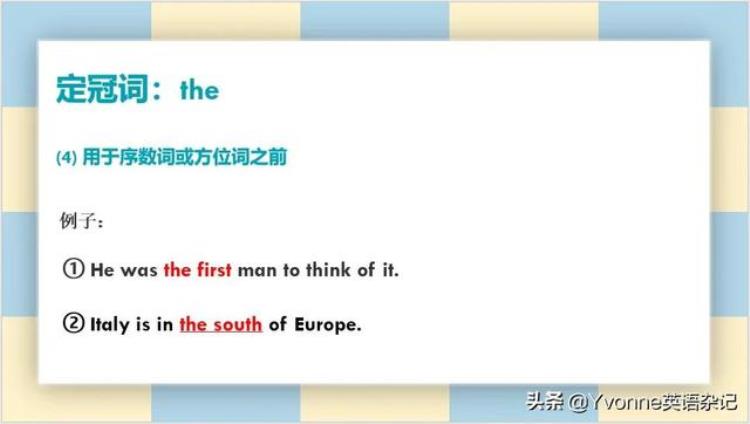
⑷ 用于序数词或方位词前
⑤ 用于乐器名词前,表示相应乐器的演奏
例子:
⑴ Besides the violin, he plays the flute too.
( violin小提琴,表示乐器,用定冠词the)
⑵ Sally is good at playing the piano.
( piano钢琴,表示乐器,用定冠词the)
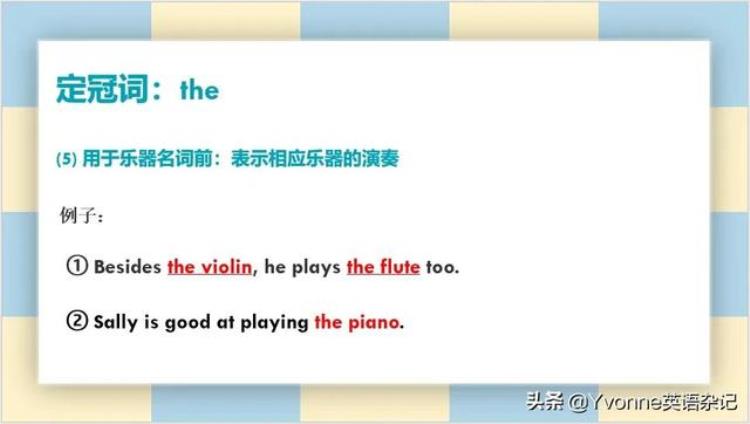
⑸ 用于乐器名词前
⑥ 用于表示人体部位,某些介词短语中指身体某个部位
例子:
⑴ We caught him by the arm.
( arm 手臂,表示身体部位,用定冠词the)
⑵ He patted me on the back.
( back 背部,表示身体部位,用定冠词the)
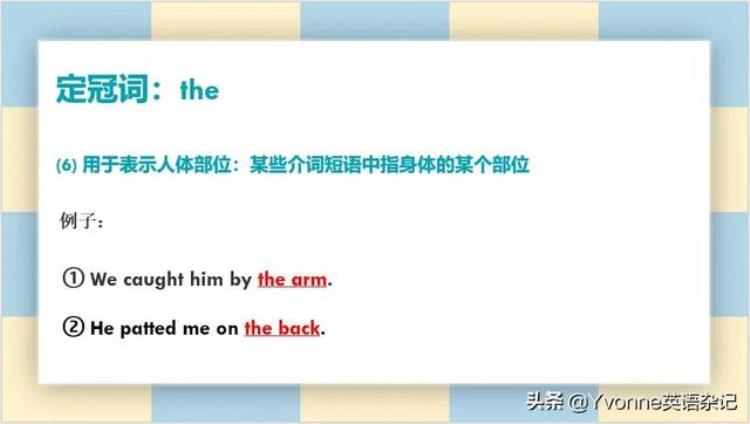
⑹ 用于表示人体部位
⑦ 用于表示一家人
例子:
⑴ The Smiths live in the apartment above ours.
( The Smiths 表示史密斯一家,用定冠词the)
⑵ The Blacks are on holiday in Sanya.
(The Blacks 表示布莱克一家,用定冠词the)
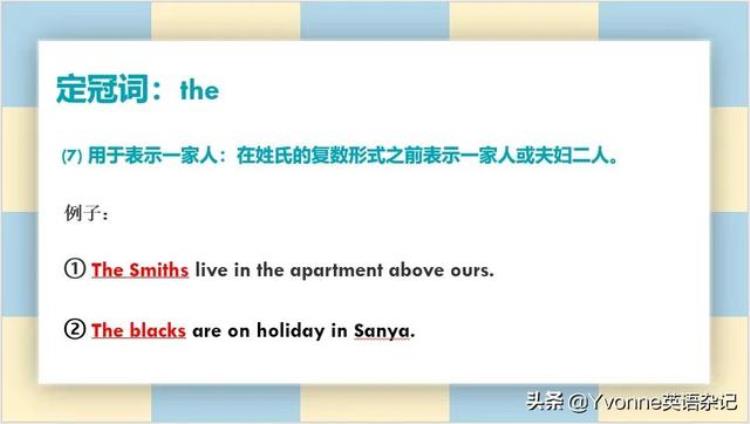
⑺ 用于表示一家人
⑧ 用于江河湖海前
例子:
⑴ The Yellow River flows into the sea.
( The Yellow River 表示黄河,用定冠词the )
⑵ The Yangtse River is the longest river in China.
(The Yangtse River 表示长江,用定冠词the )
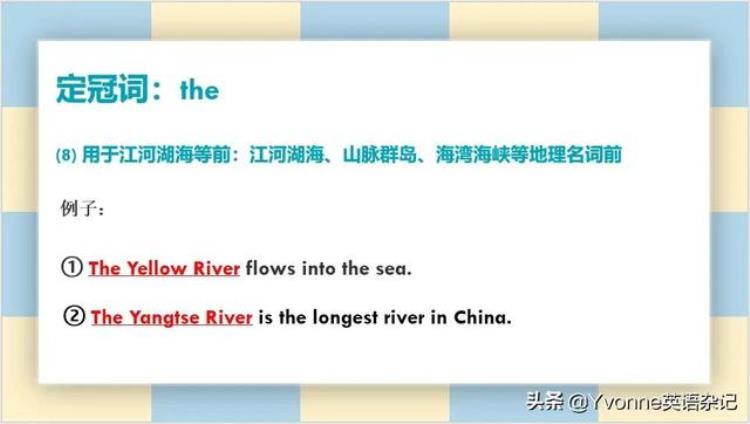
⑻ 用于江河湖海前
⑨ 用于某些普通名词的专有名词前
例子:
⑴ We visited the Great Wall yesterday.
( the Great Wall 长城,表示建筑物,用定冠词the)
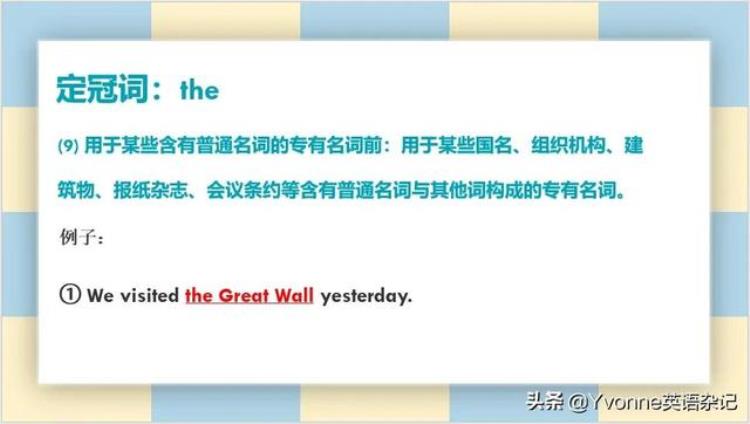
⑼ 用于某些含有普通名词的专有名词前
⑩ 用于表示类别:用于“the 某些形容词或过去分词”中表示一类人
例子:
⑴ We should help the old and love the young.
(the old 表示老年人,the young表示年轻人,用定冠词the)
⑵ The poor don't have enough food.
(the poor 表示穷人,用定冠词the)
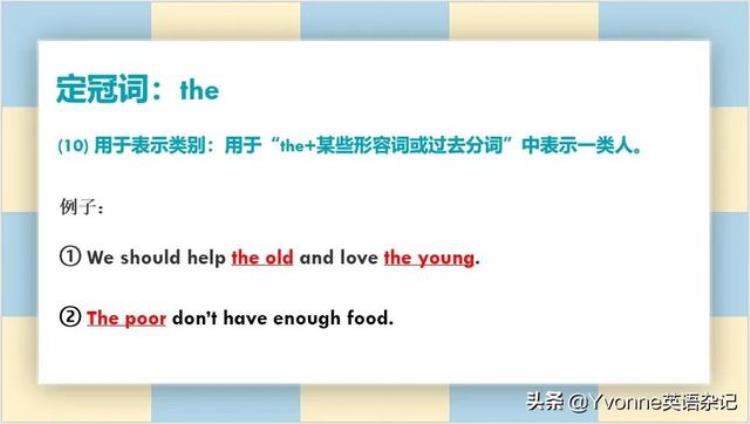
⑽ 用于表示类别
零冠词:既不加不定冠词a/an,也不加定冠词the① 专有名词,不可数名词,人名,地名前,一般不加冠词
例子:
⑴ Shenzhen is a big and beautiful city.
(Shenzhen 深圳,表示地名,不加冠词)
⑵ Peter and John are twin brothers.
(Peter and John表示人名,不加冠词)
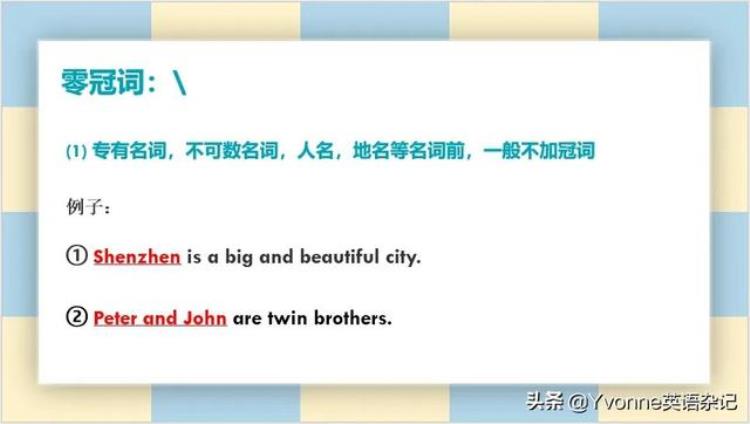
⑴ 专有名词,不可数名词,人名,地名等名词前
② 季节,月份,星期,节日,一日三餐名词前,一般不加冠词
例子:
⑴ Spring is the best season of the year.
(spring 春天,表示季节,不加冠词)
⑵ Children's Day is a day for children.
(Children's Day 儿童节,表示节日,不加冠词)
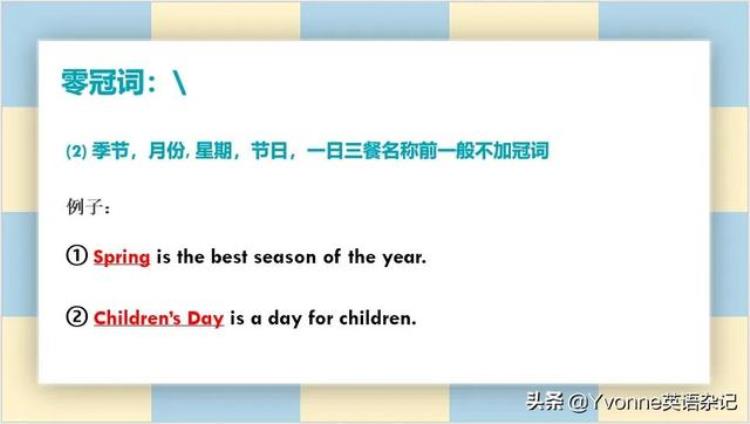
⑵ 季节,月份,星期,节日,一日三餐名称前
③ 在学科名称,三餐饭和球类运动名词前,不加冠词
例子:
⑴ Do you like Chinese or English?
(Chinese or English 表示学科,不加冠词)
⑵ The boys like to play football after school.
(football 表示球类,不加冠词)
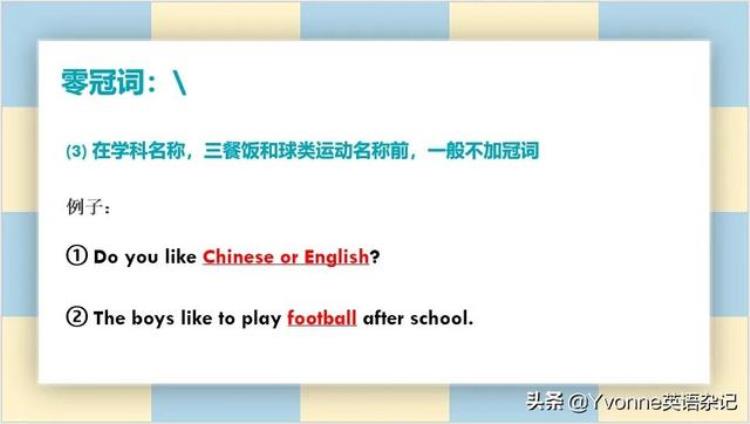
⑶ 在学科名称,三餐饭和球类运动名称前
④ 表示语言的名词前,不加冠词
例子:
⑴ He can speak both Chinese and Japanese.
(Chinese and English 表示语言,不加冠词)
⑵ I learn German in the language school.
(German 表示语言,不加冠词)
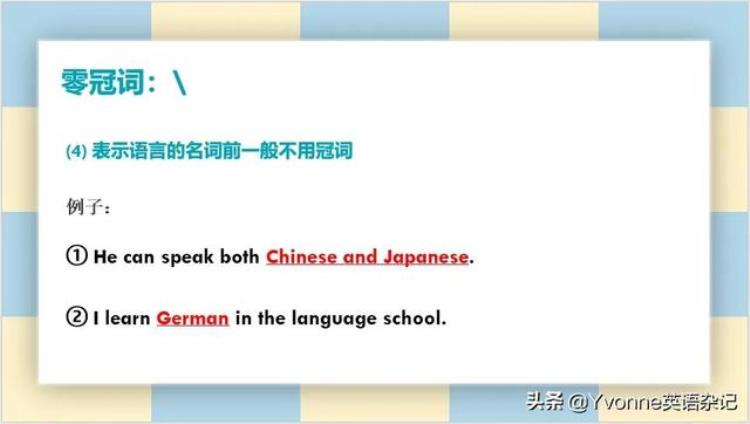
⑷ 表示语言的名词前
练习现在一起来完成练习吧!
记得划出关键词哦!
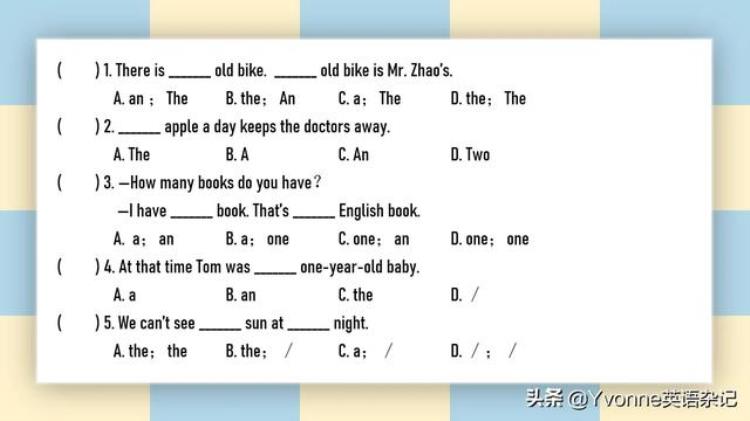
练习题
⑴ A
(关键词:“old”元音字母发音开头,用an,第二个空“old”提到第二次,用定冠词the,所以选A)
⑵ C
(关键词:“apple”元音字母发音开头,用不定冠词an, 所以选C)
⑶ C
(关键词: How many询问数量,用数词one回答,第二个空“English”元音字母发音开头,用an, 所以选C)
⑷ A
(关键词:one-year-old 辅音字母开头,用a,所以选 A)
⑸ B
(关键词:sun太阳,表示独一无二的东西,用定冠词the,第二个空at night固定搭配,所以选B)
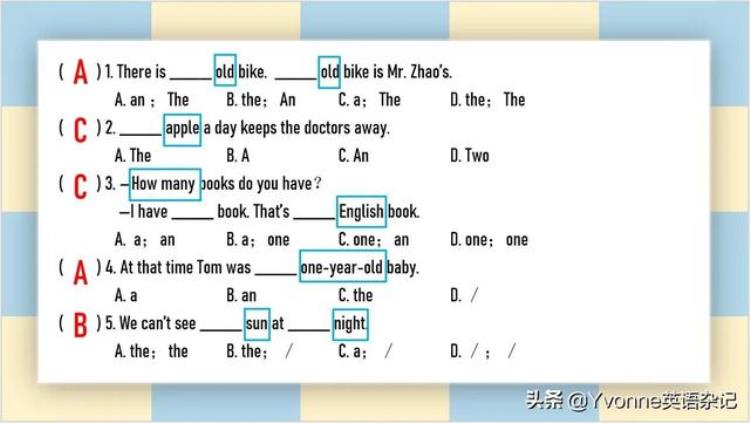
练习题答案
继续完成练习哦!
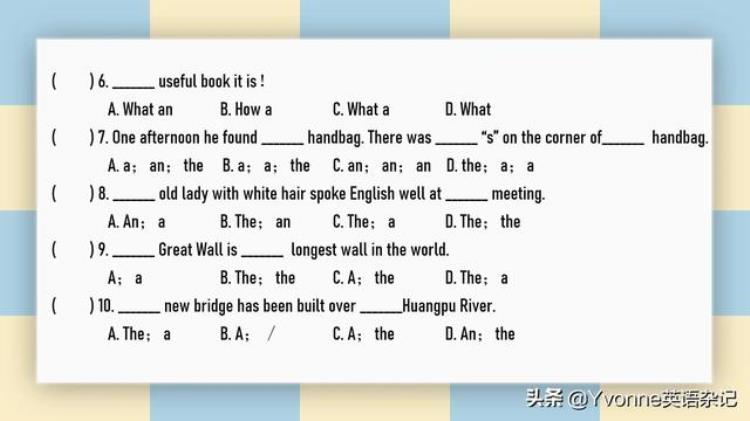
练习题
⑹ C
(关键词:useful book形容词 名词,要用What引导的感叹句,useful辅音字母发音开头用a,所以选C)
⑺ A
( 关键词:handbag辅音字母发音开头,用a,第二个空s元音字母发音开头,用an,第三个空handbag提到第二次,用定冠词the,所以选A)
⑻D
(关键词:old lady with white hair表示特指,用定冠词the,第二个空at the meeting固定搭配,所以选D)
⑼ B
(关键词:Great Wall长城,专有名词“建筑物”用定冠词the,第二个空longest最高级,用定冠词the,所以选B)
⑽ C
(关键词:new辅音字母发音开头,用a, 第二个空Huangpu River 表示江河,用定冠词the,所以选C)
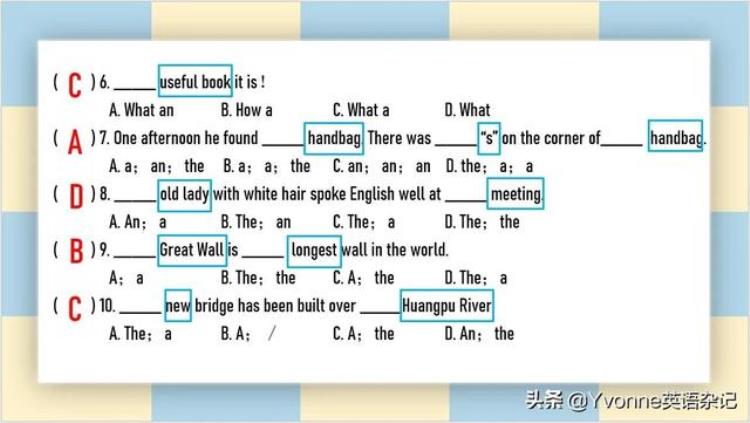
练习题答案
这就是我们今天分享的英语“冠词”啦!

Thank you
如果你有想知道的英语知识点,请在评论区留言哦!
如需课件,请私信联系哦!
下期见啦!
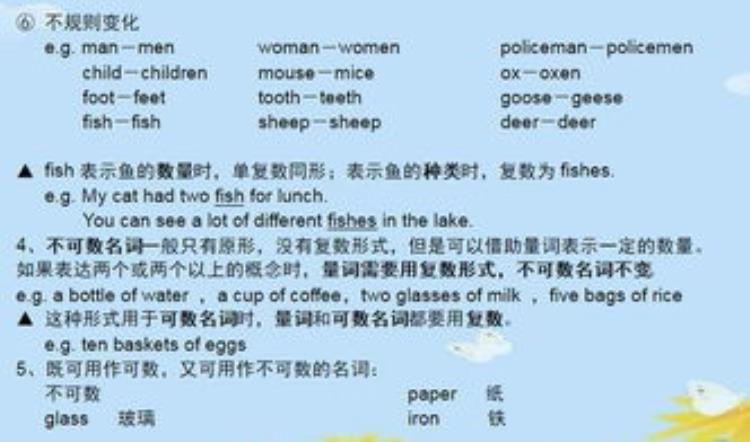
英语语法大全:冠词
以下是 为大家整理的关于《英语语法大察陵全:冠词》文章,供大家学习参考!a用在辅音音素开头的词前 eg. a book, a useful book
an用于元音开头的词前. eg. an apple, an hour
2、定冠词the
1)特指某人/某物
The book on the desk is mine.
2)世上独一无二的事物前
the sun , the moon, the earth, the sky
3)形、副级及序数词前
The third boy is the tallest of all.
注意:
He is my first English teacher.
4)the + 姓的复数表示 “某家人”或“某夫妇”。
the Greens 格林一家/ 格林夫妇
3、不用冠词的几种情况:
1)在星期、月份、季节前不用冠词
2)学科名词前
3)球类运动及早、败族戚中、晚三餐名词前(但:①当三餐名词前有修穗陆饰词时,则要加适当的冠词. ②表乐曲演奏的名词前应加the)
1) He went to school after he had a quick breakfast.
2) play the violin / piano
在有些词组中,用冠词和不用冠词意思有较大区别。
in hospital(在住院);in the hospital(在医院)
in prison( );in the prison( )
at table(吃饭,用餐);at the table(在桌旁)
in front of(在某个范围之外的前面);in the front of(在某个范围之外的前面)
go to college(上大学);go to the college(去那所大学)
take place(发生);take the place(代替)
练 习
( )1.There is ____ “s” in ____ word “bus”.
A. a ; a B. an ; the C. a ; the D. an ; a
( )2.Maths is ___ useful subject. You can’t drop it , I think.
A. an B. a C. the D. /
( )3.____ bad weather it is!
A. How B. What a C. How a D. What
( )4.—What color is ___ orange?
--It’s _____ orange.
A. an; an B. an ; the C. an ; / D. / ; an
( )5.Mr. Li is ____ old worker.
A. an B. a C. some D. /
( )6.Look at ____ picture! There’s ____ house in it.
A. a ; a B. the ; the C. a ; the D. the; a
( )7.One morning he found ____ handbag. There was ___ “s” on the corner of ___ handbag.
A. a ; an ; the B. a ; a ; the
C. a ; a ; a D. the ; an ; a ( )8.What ___ interesting story it is!
A. a B. an C. the D. /
( )9.Meimei is ___ best student in her class.
A. a B. an C. / D. the
( )10.Tom is ___ kind boy. All ___ students love him.
A. a ; / B. a ; the C. an ; / D. an ; the
( )11.Is ___ book on the desk mine? Yes.
A. the B. a C. an D. /
( )12.Even while he was in ___ hospital, he went on writing songs.
A. a B. an C. the D. /
( )13.Don’t read _____.
A. in bed B. in the bed C. on bed D. on the bed
( )14.Smith is ____ honest man.
A. a B. the C. an D. /
( )15.China has ___ population of 1,200,000,000.
A. / B. an C. the D. a
( )16.What’s ____ for “椅.子”?
A. English B. an English
C. the English D. any English
( )17.Mary is ___ cleverer of the two girls.
A. the B. a C. an D. much
( )18.____ young must look after ___ old.
A. The ; a B. The ; the C. A ; a D. A ; the
( )19. ___ earth is one of ____ planets.
A. The ; sun’s B. The ; the sun
C. The ; the sun’s D. The ; the suns’
( )20.Tokyo is ___.
A. the capital of Japan B. capital of Japan
C. Japan capital D. a capital of Japan
( )21.Kate sometimes plays ___ violin(小提琴) and sometimes plays ___ table tennis before supper.
A. / ; the B. the ; / C. the ; the D. / ; /
( )22. –Have you seen ___ pencil? I left it here this morning.
--Is it ___ red one ? I saw it.
A. a ; the B. the ; the C. the ; a D. a ; a
( )23.There is_______ orange tree behind_____ house.
A. an ; the B. a ; a C. the ; the D. an ; /
( )24.—How long did you stay there ?
--About half ___ hour.
A. / B. one C. a D. an
练习题答案:
1——5 DBDCA 6—10 DABDB
11—15 ADACD 16—20 AABCA
21—24 BDAD
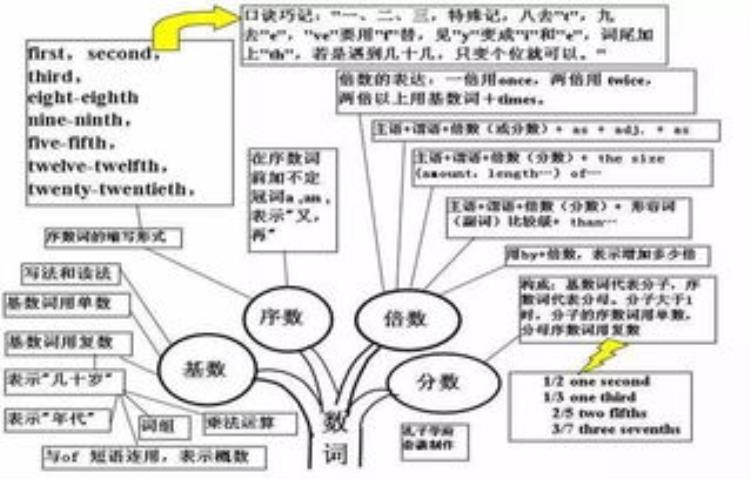
英语语法基础知识:冠词
英语语法基础知识:冠词
冠词是一个虚词,可分为定冠词,不定冠词和零冠词三类。我整理了英语语法基础知识:冠词,欢迎欣赏与借鉴。
(1)不定冠词:
a / an a unit / an uncle
元音开头的可数名词前用an :
an egg / an apple / an orange / an eraser / an answer / an ID card / an alarm clock / an actor / an actress / an e-mail / an address / an event / an example / an opera / an houran old man / an interesting book / an exciting sport / an action movie / an art lesson /
(2)定冠词:
the the egg the plane
用法:
定冠词的用法:
(1)特指某(些)人或某(些)物: The ruler is on the desk.
(2)复述上文提到的人或物:He has a sweater. The sweater is new.
(3)谈话双方都知道的人或物:The boys aren’t at school.
(4)在序数词前: John’s birthday is February the second.
(5)用于固定词组中: in the morning / afternoon / evening
不用冠词的情况:
(1)专有名词前:China is a big country.
(2)名词前有定语:this , that , my , your , some, any , no 等:
This is my baseball.
(3)复数名词表示一类人和事:Monkeys can’t swim. They are teachers.
伏衡 (4)在节日,日期,月份,季节前:Today is Christmas Day. It’s Sunday.
(5)一日三餐前:We have breakfast at 6:30.
(6)球类 棋类运动前:They often play football after class. He plays chess at home.
* 但乐器前要用定冠词:I play the guitar very well.
(7)学科名称前:My favorite subject is music.
(8)在称呼或头衔的名词前:This is Mr Li.
(9)固定词组中:at noon at night by bus
(3)零冠词,顾名思义,就是名词前不加任何冠词的情况。
1、 复数可数名词前不用任何冠词,表示泛缺带做指。
Horses are useful animals .马是有用的动物。
They are teachers. 他们是教师。
Children usually like to eat sweets. 小孩通常喜欢吃糖果。
My sister likes to read stories. 我妹妹喜欢读故事。
2、不可数名词前不用任何冠词,表示泛指。
Water is colorless .水是无色的。
Iron is one of the most useful metals. 铁是最有用的金属之一。
The world is made of matter .世界是由物质构成的。
People cant live without air .没有空气,人就无法生存。
3、 在称呼或表示官衔,职位行明的名词前不加冠词。例如:
Professor Li just came back from New Zealand. 李教授刚从新西兰回来。
Mr. Rieder likes tennis. 里德先生喜欢打网球。
What’s wrong with you, Father? 父亲,你怎么啦?
Doctor Smith sent me a birthday present yesterday. 史密斯博士昨天送给我一份生日礼物。
4、 在季节、月份、节日、假日、日期、星期等表示时间的名词之前,不加冠词。例如:
Milk is liable to go bad in summer.牛奶在夏季易变质。
She was born on October 29th .她生于十月二十九日。
We go to school from Monday to Friday. 我们从星期一到星期五都上课。
New Years Day 元旦 Womens Day 妇女节 Youth Day 青年节
On Sunday 在星期天 in winter 在冬天
5、 球类运动、游戏或表示三餐饭的名词前不用任何冠词。如:
He likes playing basketball and football. 他喜欢打篮球、踢足球。
After breakfast he goes to work. 早饭后他去上班。
The old are playing chess under the tree. 老人们在树下下棋。
We are invited to dinner in her family this evening. 我们今晚应邀去她的家吃饭。
6、 在大多数专有名词、泛指的抽象名词和物质名词前。如:
These planes are made in China. 这些飞机是中国制造的。
He is interested in science. 他对自然科学感兴趣。
We get heat and light from the sun. 我们从太阳得到热和光。
7、 前面已有人称代词、指示代词或不定代词作定语的名词前不用任何冠词。如:
My house is much bigger than his. 我家的房子比他的大多了。
This garden is newly built .这座花园是新建的。
Do you have any classes this afternoon? 今天下午你们有课吗?
We must make good use of our time. 我们要充分利用时间。
8、 当by与交通工具连用,表示一种方式时,中间无冠词。如:
by train 乘火车 by boat 乘船 by spaceship 乘宇宙飞船
on foot 步行 by bus 乘公共汽车
9、 某些习语或固定词组中的名词前不用任何冠词这种用法是约定束成的,我们只有遵从而无旁的选择。
go to bed 睡觉 go to school 去上学 in hospital 住院 in bed 在床上
at night 在夜间 for example 例如 place of interest 名胜 on show 展出
in surprise 惊奇地 from time to time不时地 in case 以防万一 in fact 事实上
in memory of为纪念 keep pace with 跟上…步伐
拓展:
英语语法的基础知识
一、英语语句基本结构分析:
主谓宾结构:
主语:可以作主语的成分有名词(如boy),主格代词(如you),动词不定式,动名词等。主语一般在句首。注意名词单数形式常和冠词不分家!
谓语:谓语由动词构成,是英语时态、语态变化的主角,一般在主语之后。不及物动词(vi.)没有宾语,形成主谓结构,如:We come.
宾语:宾语位于及物动词之后,一般同主语构成一样,不同的是构成宾语的代词必须是‘代词宾格’,如:me,him,them等
例:The boy needs a pen.主语the boy,谓语needs(need的第三人称单数形式),宾语a pen.
主系表结构:
主语:同‘主谓宾’结构。
联系动词(Link verb):be动词(am,is,are,was,were,have been);其他联系动词如:become成为,turn变成,go变。其特点是联系动词与其后的表语没有动宾关系,表语多为形容词或副词,既,不可能是宾语。
表语:说明主语的状态、性质、等。可为形容词、副词、名词、代词、不定式、分词。当联系动词不是be,而其后是名词和代词时,多表达‘转变为’之意,注意与动宾关系的区别。
感官动词多可用作联系动词:look well/面色好,sound nice/听起来不错,feel good/感觉好,smell bad/难闻
例:Tom is a boy.(Tom是个男孩)/主语为Tom,系词为be动词的第三人称单数is,表语为a boy
There be结构:
There be表示‘存在有’。这里的there没有实际意义,不可与副词‘there那里’混淆。
此结构后跟名词,表示‘(存在)有某事物’
试比较:There is a boy there.(那儿有一个男孩。)/前一个there无实意,后一个there为副词‘那里’。
二、定语:定语是对名词或代词起修饰、限定作用的词、短语或句子,汉语中常用‘……的’表示。
定语通常位于被修饰的成分前。若修饰some,any,every,no构成的复合不定代词时,(如:something、nothing);或不定式、分词短语作定语、从句作定语时,则定语通常置后。副词用作定语时须放在名词之后。
形容词作定语:
The little boy needs a blue pen.(little修饰名词boy;blue修饰名词pen.)/小男孩需要一支兰色的钢笔。
Tom is a handsome boy./Tom是个英俊的男孩。
There is a good boy./有个乖男孩。
数词作定语相当于形容词:
Two boys need two pens./两个男孩需要两支钢笔。
The two boys are students./这两个男孩是学生。
There are two boys in the room./房间里有两个男孩。
代词或名词所有格作定语:
His boy needs Toms pen./他的男孩需要Tom的钢笔。
His name is Tom./他的名字是汤姆。
There are two boys of Toms there./那儿有Tom家的两个男孩。
介词短语作定语:
The boy in the classroom needs a pen of yours./教室里的男孩需要你的一支钢笔。
The boy in blue is Tom./穿兰色衣服的孩子是汤姆。
There are two boys of 9,and three of 10./有两个9岁的,三个10岁的男孩。
名词作定语:
The boy needs a ball pen./男孩需要一支圆珠笔。
It is a ball pen./这是一支圆珠笔。
There is only one ball pen in the pencil box./这铅笔盒里只有一支圆珠笔。
副词作定语:
The boy there needs a pen./那儿的'男孩需要一支钢笔。
The best boy here is Tom./这里最棒的男孩是Tom。
不定式作定语:
The boy to write this letter needs a pen./写这封信的男孩需要一支钢笔。
The boy to write this letter is Tom./将要写这封信的男孩是汤姆。
There is nothing to do today./今天无事要做。
分词(短语)作定语:
The smiling boy needs a pen bought by his mother./那个微笑的男孩需要一支他妈妈买的钢笔。
The pen bought by her is made in China./她买的笔是中国产的。
There are five boys left./有五个留下的男孩。
定语从句:
The boy who is reading needs the pen which you bought yesterday./那个在阅读的男孩需要你昨天买的钢笔。
The boy you will know is Tom./你将认识的男孩叫汤姆。
There are five boys who will play the game./参加游戏的男孩有五个。
学好英语语法不仅能在考试中提高成绩,还能在以后的生活交流中提高语感和口语能力,能让你说出一句流畅的英语。
;
文章评论